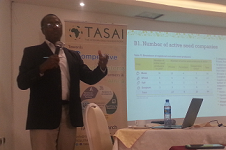A study reviews seeds development and distributions in Ethiopia focusing on four major crops namely maize, teff, wheat, and sorghum.
Compared to 2017, the number of active seed breeders in Ethiopia for the four crops has increased from 74 in 2017 to 122 in 2020, according to the draft study by The African Seed Access Index (TASAI) presented at a workshop in Addis Ababa, Ethiopia this morning. Out of the total 122 breeders 110 were men.
Seed breeding
When looked at by crop 42 were engaged in wheat seed breeding, 27 in maize, 22 in teff, and 31 in sorghum. The study stated that all breeders in Ethiopia work in public research institutes and universities. Of the total 61 of the breeders work at the country’s national agricultural institute – Ethiopia Institute for Agricultural Research (EIAR).
While the rest work in Amhara Regional Agricultural Research Institute (ARARI), South Agricultural Research Institute (SARI), Oromia Agricultural Research Institute (OARI), Tigray Agricultural Research Institute (TARI), Somali Pastoral and Agro-pastoral Research Institute (SOPARI).
Producing seed to smallholder farmers
All local producers use varieties released by these institutions, according to the study, which stated that multinational companies do not have local breeders, but instead import basic seed from abroad.
In relation to the number of companies engaged in producing the seeds that will be distributed to smallholder farmers there were 27 active private companies in Ethiopia in 2020 out of the total 54 companies, which includes cooperative unions and parastatals, which were 23, and 4 respectively.
Out of the 27 private seed producing companies 23 were producing maize seed, while 6 were producing teff seed, 4 engaged in wheat seed production, and 2 companies produced sorghum, according to the study of TASAI.
Completeness
“Under the industry competitiveness category, maize and wheat are the main crops, and a few producers dominate the seed markets. Except for maize the share of the 4 parastatals is high up to 90 percent. Market concentration is high for all the 4 reviewed crops approaching monopoly conditions, with the exception of maize,” the draft study stated.
It stated that the marketing system of seeds in Ethiopia over the last decade from centralized distribution system to a multiple channel.
“…Though varying greatly across the surveyed crops, only 39 percent of the seed was centrally allocated by the government in 2020, and the remaining seed was old by producers through different channels,” the draft study stated.
Among the challenges mentioned in the report includes absence of standardized and uniform data collection and updating mechanism by both the private sector and public institutions engaged in seed business in Ethiopia. It also stated that the regulations of Ethiopia related to seed has to be inline and should be harmonized with that of the Common Market for Eastern and Southern Africa (COMESA), which Ethiopia is a member state.
The research company, The African Seed Access Index (TASAI) monitors indicators that are essential to seed sector development at national level. TASAI’s ultimate aim is to publish an annual scorecard that captures the vibrancy and competitiveness of the formal seed sector in the African countries where TASAI is active.

